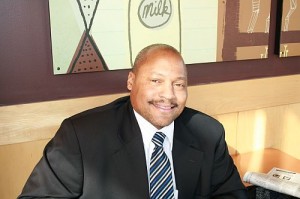
Detroit mayoral candidate Duane Montgomery (Photo: Minehaha Forman)
Duane Montgomery is one of the lesser known of the 14 candidates running for mayor in the upcoming Detroit special election. But he has some unique — and some downright strange — ideas about how to keep the city growing during what he calls “emergency times.”
His proposals include taxing casinos, giving away abandoned houses to city residents and arming city workers such as water meter readers and bus drivers.
Currently Montgomery, a human resources consultant, is virtually unknown in a race against established political names like Mayor Kenneth Cockrel Jr. and former Deputy Mayor Freman Hendrix. But he’s optimistic that he has a chance if he keeps up his “old-fashioned, grass-roots campaigning.”
Montgomery maintains a campaign website outlining his plans for the city along with past “indiscretions” including a high school knife fight, two possible “love children” an assault charge and a CCW violation. He says this honesty about his past is proof of his commitment to the city and ensures trust in him.
One of the policies on the forefront of his agenda is taxing Detroit casinos up to $250 million a year for four years, a move even he calls “political suicide.”
While virtually all of his opponents have criticized this plan, Montgomery says he thinks it’s the only option for the city to raise funds in this economic climate.
Another candidate, Wayne County Sheriff Warren Evans, criticized Montgomery in the last mayoral debate on the casino tax, saying: “I see [casinos] as a larger source of revenue. I think [more taxing] is sending the wrong message. It’s a business. They’ll cut cost somewhere else by laying off people and other things.”
Candidate Joseph Holt also countered Montgomery’s casino tax plan. “I don’t think we can balance our budget on casinos unless there’s a big influx of people wanting to gamble all of a sudden,” he said.
But Montgomery said he is not paying attention to the criticism. He believes that revenue from casino taxes would be enough to create city-owned businesses, including a hotel, a shopping center and a city-owned casino.
On top of that, he said every Detroiter could expect a decrease in property taxes up to 25 percent, a decrease in city income tax of 10 percent and an increase in bulk trash pickup to twice a month.
Regarding city crime, Montgomery proposes a strange and potentially awkward solution: Train all city workers to be first responders and give them guns. This would be an optional program for city workers who want overtime. Essentially a bus driver could moonlight as a cop if he opted to become what Montgomery calls a “public safety officer.”
Trained responders — anyone from a water meter reader to a trash worker — would be able to don public safety uniforms, carry guns and respond to “low-priority crimes” so regular police and fire workers could respond more quickly to more serious situations.
“This means the city would have the flexibly of turning a 3,000-man police force to a 6,000-man police force by reassigning current employees,” Montgomery said. Funding training and additional equipment would be taken from the casino tax increase, he added.
Under his plan, residents could expect to see garbage trucks responding to a crime or buses showing up at a crime scene. “It might not be a police car, but someone will come,” he said. The plan would deter crime, he said, by creating a “massive public safety officer presence.”
“Detroit is missing fresh ideas,” he said. “None of the candidates are going to get revenue. They’re not here to work for the people.”
Montgomery also proposes cutbacks in city spending, including slashing the budget of the city’s Legal Department, which he said settles or loses too many cases, and cutting funding to the General Services Department, which oversees basic city services such as snow removal and city maintenance.
To make up for cuts in general services, Montgomery would champion a regional pooling effort to cut costs on road repair, vehicle maintenance, snow removal, and city health benefits. But this idea could be thwarted by legal roadblocks set by the state the to control regionalism.
Additionally, Montgomery suggests supplying local block clubs with equipment such as tractors and trucks so they could plow snow and remove trees on their own block without waiting for the city.
Blight is a problem he said he would address using the late Mayor Coleman Young’s plan of offering abandoned houses for $1 to residents who would be willing to renovate them. Unlike Young’s plan, though, Montgomery’s would forgive pre-existing back taxes and liens on property and would not require payment of property tax for two to three years.
For those who are facing financial hardships and risk losing basic utility service, Montgomery would halt all water shut-offs in the city. “You can’t turn off people’s water,” he said. “That’s a lifesaving commodity.”
He would also use casino tax revenue to pay Detroit energy providers to keep power on in houses during the winter months. He said liens — when water bill is rolled into taxes and leads to foreclosure — would continue, but he would not mandate any evictions in the winter.
Unlike his opponents, Montgomery said he is not counting on the Obama stimulus package to help Detroit, and he suspects the state will absorb much of the stimulus money.
Though some of his ideas may not be logistically sound, Montgomery said, leadership “has to start somewhere.”
He also acknowledged that he is not favored to win the Feb. 24 special primary or the May special election, but he vowed to stay in the running with a focus in winning the August primary and the November general election.
“Would you rather spend money on campaigning for a six-month term or a four-year term?” he asked.




